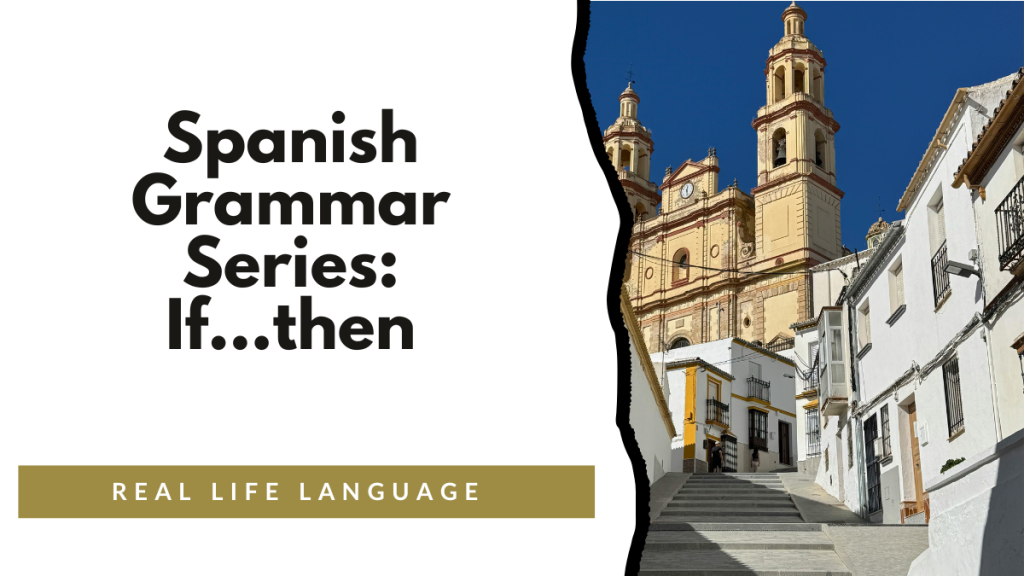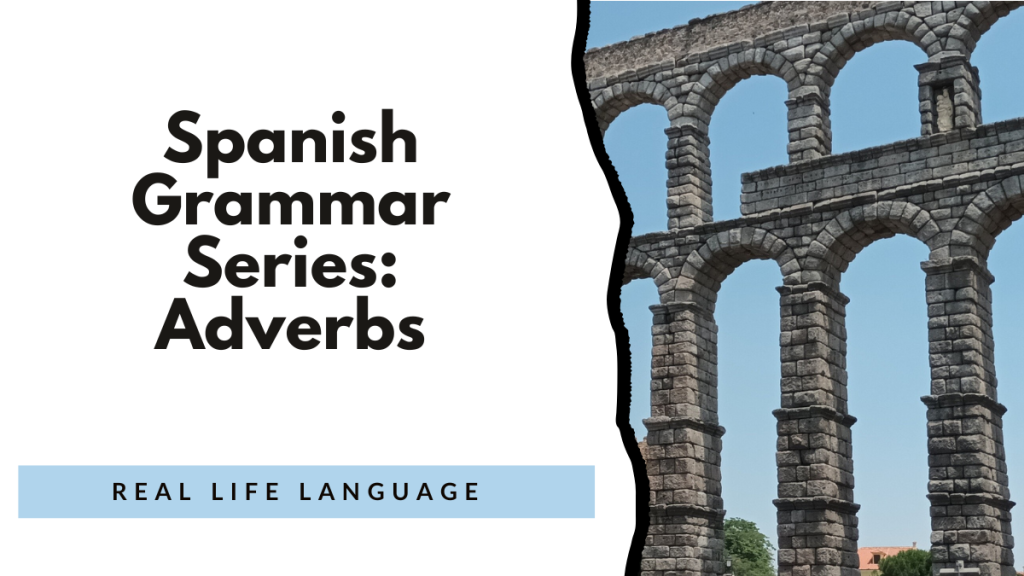(El Subjuntivo en Cláusulas Adjetivales y Adverbiales)
The subjunctive mood is used in Spanish to express doubt, uncertainty, desire, emotion, purpose, or nonexistence — situations that are not yet real or guaranteed.
In this guide, we’ll look at two common contexts where the subjunctive appears:
Adjective Clauses and Adverbial Clauses
1) Review: What Is a Clause?
A clause is a group of words with its own subject and verb.
In Spanish, the subjunctive often appears in a dependent clause that is connected to a main clause by a relative pronoun (que) or a conjunction (para que, cuando, etc.).
| Example | Type |
| Quiero que vengas. → I want you to come. | noun clause |
| Busco un libro que sea interesante. → I’m looking for a book that is interesting. | adjective clause |
| Te llamaré cuando llegues. → I’ll call you when you arrive. | adverbial clause |
2) Adjective Clauses
(Cláusulas Adjetivales)
An adjective clause describes a noun — just like an adjective.
It’s introduced by que or another relative pronoun (like quien, donde).
The subjunctive is used when the noun being described is unknown, nonexistent, or indefinite.
A. When to Use the Subjunctive in Adjective Clauses
Use the subjunctive when the noun may not exist or is not specific.
| Main Clause | Connector | Subordinate Clause | Example |
| Busco un libro | que | tenga información sobre España. | I’m looking for a book that has information about Spain. (unknown book) |
| ¿Conoces a alguien | que | hable francés? | Do you know anyone who speaks French? (may or may not exist) |
| No hay nadie | que | pueda ayudarme. | There’s no one who can help me. (does not exist) |
The subjunctive expresses nonexistence or uncertainty.
B. When to Use the Indicative
Use the indicative when the noun is known, definite, or certain to exist.
| Subjunctive (uncertain) | Indicative (certain) |
| Busco un profesor que hable inglés. → I’m looking for a teacher who speaks English. (unknown person) | Conozco al profesor que habla inglés. → I know the teacher who speaks English. (specific person) |
| No hay nadie que pueda hacerlo. | Hay alguien que puede hacerlo. |
C. More Examples
| English | Spanish |
| I want a house that’s near the beach. | Quiero una casa que esté cerca de la playa. |
| I live in a house that’s near the beach. | Vivo en una casa que está cerca de la playa. |
| There isn’t anyone who can help. | No hay nadie que pueda ayudar. |
| We need a car that works. | Necesitamos un coche que funcione. |
D. Common Patterns That Trigger the Subjunctive in Adjective Clauses
| Expression | Example |
| Busco un/una… que | Busco una persona que sepa francés. |
| Quiero un/una… que | Quiero un coche que sea económico. |
| Necesito un/una… que | Necesito un asistente que pueda viajar. |
| No hay nadie que | No hay nadie que entienda esto. |
| No conozco a nadie que | No conozco a nadie que viva allí. |
| ¿Hay alguien que…? | ¿Hay alguien que tenga tiempo? |
3) Adverbial Clauses
(Cláusulas Adverbiales)
An adverbial clause tells when, why, how, or under what condition something happens — just like an adverb.
They begin with conjunctions such as para que, antes de que, cuando, aunque, etc.
Whether you use the subjunctive or the indicative depends on the meaning and context.
A. Always Use the Subjunctive with These Conjunctions
These express purpose, intention, or condition — actions that may or may not happen.
| Conjunction | Meaning | Example |
| para que | so that | Te llamo para que vengas. → I’ll call you so that you come. |
| a menos que | unless | Iremos a menos que llueva. → We’ll go unless it rains. |
| antes de que | before | Sal temprano antes de que lleguen. → Leave early before they arrive. |
| sin que | without | Lo hizo sin que yo lo supiera. → He did it without my knowing. |
| con tal de que | provided that | Puedes ir con tal de que estudies después. → You can go provided that you study afterward. |
| en caso de que | in case | Lleva dinero en caso de que lo necesites. → Bring money in case you need it. |
These always require two different subjects — otherwise, use an infinitive (see below).
B. When to Use the Infinitive Instead of Subjunctive
If there’s no change in subject, use the infinitive (not subjunctive) and drop “que.”
| Subjunctive (different subjects) | Infinitive (same subject) |
| Salgo antes de que llegues. → I’ll leave before you arrive. | Salgo antes de llegar. → I’ll leave before arriving. |
| Estudia para que tengas éxito. | Estudia para tener éxito. |
C. Sometimes Subjunctive, Sometimes Indicative
For these conjunctions, use:
- Subjunctive if the action is future, uncertain, or not yet completed.
- Indicative if the action is habitual or completed.
| Conjunction | Meaning | Subjunctive Example (Future / Uncertain) | Indicative Example (Habitual / Past) |
| cuando | when | Te llamaré cuando llegues. (I’ll call when you arrive.) | Siempre te llamo cuando llegas. (I always call when you arrive.) |
| después de que | after | Lo haré después de que termines. | Lo hago después de que termino. |
| tan pronto como | as soon as | Voy a salir tan pronto como pueda. | Salgo tan pronto como puedo. |
| en cuanto | as soon as | Te avisaré en cuanto sepa algo. | Te aviso en cuanto sé algo. |
| hasta que | until | No salgas hasta que termine. | No salgo hasta que termina. |
| aunque | although / even if | Aunque sea difícil, lo intentaré. (even if it’s hard) | Aunque es difícil, me gusta. (although it’s hard) |
D. More Examples
| English | Spanish |
| We’ll wait until they arrive. | Esperaremos hasta que lleguen. |
| She studies so that she can pass. | Estudia para que pueda aprobar. |
| I’ll do it after you call. | Lo haré después de que llames. |
| I’ll go even if it rains. | Iré aunque llueva. |
| He leaves before I wake up. | Sale antes de que me despierte. |
4) Summary Charts
A. Adjective Clauses
| Situation | Mood | Example |
| Known / Certain / Exists | Indicative | Tengo un libro que habla de Cuba. |
| Unknown / Nonexistent / Hypothetical | Subjunctive | Busco un libro que hable de Cuba. |
B. Adverbial Clauses
| Conjunction Type | Mood | Example |
| Always trigger subjunctive (para que, antes de que, a menos que…) | Subjunctive | Voy a estudiar antes de que llegues. |
| Future or uncertain action (cuando, hasta que, después de que…) | Subjunctive | Llamaré cuando llegues. |
| Habitual or past action | Indicative | Llamo cuando llegas. |
| Same subject (no “que”) | Infinitive | Voy a estudiar antes de llegar. |
5) Practice: Fill in the Blanks
- Busco a alguien que ________ (poder) ayudarme.
- Te llamaré cuando ________ (terminar) la reunión.
- No hay nadie que ________ (saber) la respuesta.
- Saldré antes de que tú ________ (venir).
- Siempre estudio cuando ________ (tener) tiempo.
Answers:
- pueda
- termine
- sepa
- vengas
- tengo
6) Practice: Translate
- I want a friend who lives nearby.
- We’ll go unless it rains.
- There’s no one who knows the truth.
- I’ll wait until you call.
- They study so that they can pass.
Answers:
- Quiero un amigo que viva cerca.
- Iremos a menos que llueva.
- No hay nadie que sepa la verdad.
- Esperaré hasta que llames.
- Estudian para que puedan aprobar.
7) Common Pitfalls & Fixes
| Wrong | Correct | Why |
| Busco una casa que tiene jardín. | Busco una casa que tenga jardín. | Unknown or hypothetical → subjunctive |
| Voy a salir antes de que tú llegas. | Voy a salir antes de que tú llegues. | Time clause about the future → subjunctive |
| Estudio para que tener éxito. | Estudio para tener éxito. | Same subject → infinitive |
| No hay nadie que sabe la respuesta. | No hay nadie que sepa la respuesta. | Nonexistent person → subjunctive |
| Siempre te llamo cuando llegues. | Siempre te llamo cuando llegas. | Habitual action → indicative |
Why This Matters
Using the subjunctive in adjective and adverbial clauses helps learners:
- Communicate uncertainty, purpose, and emotion precisely
- Understand complex sentence relationships
- Master advanced structures common in authentic Spanish
- Move from sentence-level to paragraph-level fluency
It’s a hallmark of intermediate–advanced proficiency and essential for AP, IB, and university-level Spanish learners.
Here are some of my favorite resources to engage and inspire learners, to include my lifelong language learning journey.
Building Proficiency for World Language Learners: 100+ High-Interest Activities
Discover over 100 dynamic activities to make world language learning interactive and fun. I wrote this book with some of my favorite activities for educators aiming to build proficiency with high-impact strategies.
Learn more and get your copy here.
5 Weeks of No and Low Prep Fun
Need quick, engaging activities for your class? This free guide includes 25 no-prep and low-prep ideas to save time while keeping students excited about learning.
Download your free copy now.
100s of videos to learn Spanish:

